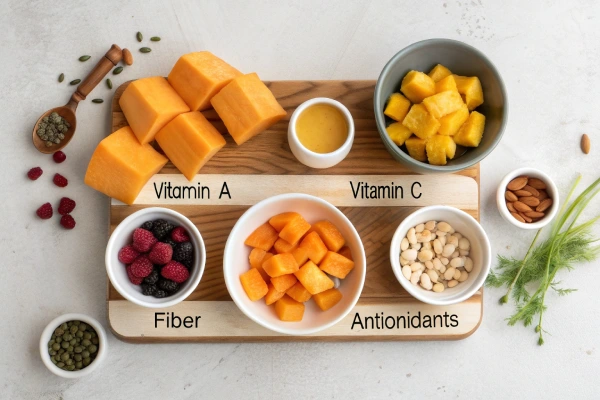What are the benefits of eating butternut squash soup? Butternut squash soup is a warm, delicious dish known for its silky texture and slightly sweet flavor. More than just an easy meal, it’s packed with vital nutrients that support overall health.
The main ingredient, butternut squash, is rich in vitamins, minerals, and antioxidants. These nutrients play a key role in maintaining good health, from boosting immunity to promoting heart health and digestion.
In this post, we’ll explore the many health benefits of butternut squash soup and why it’s a must-have in your diet. Whether you enjoy it on a cold winter day or as part of your weekly meal plan, this soup offers more than just great flavor—it’s a nutritious and comforting choice.
Table Of Contents
Table of Contents
Key Nutrients in Butternut Squash Soup

Butternut squash is packed with beneficial nutrients, making it a great supplement to any diet. The deep orange hue isn’t just for looks It also signals a high quantity of minerals, vitamins, and antioxidants. Let’s take a closer review of the most important ingredients of butternut squash, which makes it healthy and nutritious:
Vitamins and Minerals
| Vitamin | Benefits | Source in Butternut Squash |
|---|---|---|
| Vitamin A | Essential for maintaining healthy eyesight, boosting immunity, and promoting skin health. Contains beta-carotene, which the body converts into Vitamin A naturally. | Butternut squash is a rich source of beta-carotene, a plant-based precursor to Vitamin A. |
| Vitamin C | Boosts immunity, aids collagen production for healthy skin and wound healing, and acts as a powerful antioxidant to protect against inflammation and oxidative stress. | Abundant in butternut squash, supporting both skin health and overall immunity. |
| Folate | Vital for cell development, DNA synthesis, and preventing neural tube defects during pregnancy. Supports red blood cell health and overall cardiovascular health. | Naturally occurring in butternut squash, providing an essential water-soluble B vitamin for maintaining cell health. |
Antioxidants and Phytochemicals
The vibrant orange hue in butternut squash is an indication of its high carotenoid content, specifically beta-carotene. Carotenoids are potent antioxidants that assist in neutralizing free radicals that are present in the body. Free radicals are known to create cell destruction and raise the chance of developing chronic illnesses. Butternut squash’s antioxidants aid in protecting the body from the effects of free radicals.
- Beta-carotene As mentioned earlier beta-carotene is a form of carotenoid, which our body transforms to vitamin A. It has anti-inflammatory properties and improves eye health, defending the eyes from problems such as macular degeneration as well as cataracts. Beta-carotene can also lower the incidence of certain cancers because of its antioxidant properties.
- Lutein: A second carotenoid in squash like butternut, lutein performs vital roles in promoting eye health by blocking harmful light and preventing the development of age-related eye problems like cataracts as well as macular degeneration.
Fiber Content
Butternut squash is a great source of fiber in the diet, which is vital for a healthy digestive. A diet that is rich in fiber can help to regulate bowel movements, reduce constipation, and reduce the risk of developing certain gastrointestinal diseases. Additionally, fiber plays an important role in the regulation of blood sugar as well as heart health.
- Soluble fiber is a great way to lower cholesterol levels as well as control blood sugar levels. It can also reduce the absorption process of sugars in the bloodstream and can be beneficial for people with diabetes or those seeking to regulate glucose levels.
- Insoluble Fiber Insoluble fiber is a source of the bulk of stool encouraging regular bowel movements as well as preventing constipation. It also aids in maintaining an optimal gut microbiome which is crucial for overall well-being.
Health Benefits of Eating Butternut Squash Soup

Butternut squash soup is a great source of nutrition and offers many health advantages. Here are a few of the best benefits of incorporating this nutritious soup into your diet
Supports Digestive Health
The fiber-rich content of butternut squash plays an important role in assisting the digestive system. Fiber aids in maintaining normal bowel movement prevents constipation, and encourages the development of beneficial bacteria in the gut. This is vital to maintaining an optimal digestive system and keeping gastrointestinal diseases at bay, like irritable bowel syndrome (IBS) and diverticulosis.
Along with the fiber in the squash, it also has water, which can help soften stool and facilitate the passage through the digestive tract. A well-functioning digestive system is vital for general health as it impacts the absorption of nutrients and immune function. It can even mood regulation.
If you’re interested in knowing the nutritional benefits of butternut squash, and why it’s an excellent choice for your digestive health read this thorough guide to why soup made of butternut squash is healthy to get a deeper look into its nutritional and health benefits. value.
Boosts Immunity
The soup of butternut squash is brimming with minerals and vitamins that boost immunity. Vitamin C is particular vitamin is a key component of the immune system, stimulating the creation of white blood cells, which assist in fighting off infections. It also functions as an antioxidant, shielding the body from stress oxidative which could affect the immune system.
Beta-carotene, an antioxidant that is found in butternut squash also aids in boosting immune health by reducing inflammation and assisting our body’s immune system. Beta-carotene’s anti-inflammatory properties can lower the risk of developing chronic illnesses like asthma, arthritis, and heart disease.
Promotes Healthy Skin
The antioxidants found in butternut squash, like beta-carotene and vitamin C are vital for healthy skin. These nutrients shield the skin from harmful consequences caused by UV (UV) radioactivity and pollutants. Vitamin A helps to promote cell renewal by preventing premature aging and helping to maintain youthful skin.
Butternut squash soup can ensure that your skin stays healthy by providing your body with the nutrients it needs to strengthen and safeguard skin cells. A regular intake of squash can result in smoother more hydrated skin and less appearance of fine lines and wrinkles.
Aids Weight Loss
The soup of butternut squash is light in calories but packed with vital nutrients which makes it an excellent choice for those trying to lose weight. The high content of fiber in the soup can create an overall feeling of fullness, which reduces the chance of overeating. It also regulates glucose levels in the blood, which can prevent the sudden cravings that can cause unhealthy eating habits.
The soup’s low-fat content makes it heart-healthy soup and weight-friendly. If you substitute high-calorie comfort foods with a cup of butternut squash soup you’ll be able to have a nutritious, satisfying food without the extra calories.
Improves Heart Health
Soup made from butternut squash can be a great option for supporting the cardiovascular system. The potassium content of butternut squash can help regulate blood pressure, counteracting the effects of sodium on the body. Potassium is also a key ingredient in maintaining fluid balance and decreases the chance of having a stroke or other heart-related problems.
The antioxidants found in butternut squash, including beta-carotene and vitamin A can reduce inflammation, as well as stress caused by oxidation which are both associated with the development of heart diseases. Fiber, a key ingredient in butternut squash assists in lowering cholesterol levels and decreasing the risk of developing atherosclerosis. an underlying condition where plaque builds up in arterial walls and blocks the flow of blood.
How to Prepare Butternut Squash Soup

Making soup from butternut squash is easy and only requires a few ingredients. Here’s a quick recipe to start:
Ingredients
- One medium butternut squash peeled and cut into cubes
- 1 medium onion, diced
- 2 cloves garlic, minced
- 4 cups vegetable broth
- 1 tablespoon olive oil 1 tablespoon olive
- Salt and pepper according to your preference
- Optional Cocoa milk, cream, or even coconut for a more creamy texture
Instructions
- In the olive oil, heat the large pot to medium-high temperature. Add the garlic and onion and cook until tender and tender (about 5 mins).
- Add the squash cubes to the pot, and stir. Cook for 5 more minutes.
- Add the vegetable broth, and bring to the point of boiling. When it is boiling, turn off the heat and let it simmer for 20 mins, or until the squash is soft.
- Make use of an immersion blender to blend your soup to smooth or transfer the soup to a blender in a series.
- Add salt and pepper. Then, add coconut milk or cream if desired.
- Serve hot, and garnish with a few fresh herbs. Enjoy!
FAQ About What Are The Benefits Of Eating Butternut Squash Soup?
Is butternut squash soup good for you?
Yes, butternut squash soup is highly nutritious. It’s rich in vitamins A and C, fiber, and antioxidants, which support immunity, eye health, and overall well-being.
What does butternut squash do for the body?
Butternut squash provides essential nutrients like vitamin A for vision, vitamin C for immunity, and potassium for heart health. Its antioxidants also help reduce inflammation and support healthy skin.
Is it okay to eat butternut squash every day?
Yes, eating butternut squash daily is generally safe and beneficial. However, balance it with other vegetables to ensure a varied and well-rounded diet.
Is butternut squash good for your gut?
Absolutely! Butternut squash is high in fiber, which promotes healthy digestion, supports gut bacteria, and helps prevent constipation.
Conclusion
The soup of butternut squash is a nutrient-rich and delicious meal that provides many health benefits. From improving immunity to promoting digestion and heart health, this simple soup is packed with essential vitamins, minerals, and antioxidants.
It’s an excellent way to incorporate more vegetables into your diet while enjoying a comforting and satisfying meal. Whether you prepare it at home or enjoy it at your favorite restaurant, butternut squash soup is a versatile and nutritious addition to any menu.
So, the next time you’re looking for a warm, wholesome dish, reach for a bowl of butternut squash soup to reap its numerous health benefits.
Looking for more tasty recipes and cooking inspiration? Connect with us on Facebook at Dashtasty and become part of our foodie family.



